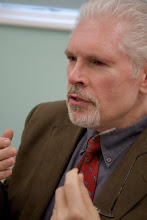"What I can do is put people through an intense experience. Maybe in a small way from that you can change things. - Sarah Kane
As I left the play on Monday night, I was disgusted and wondering what the hell the point of it all could have been. I felt the same as my classmates; eating babies, rape, gouging eyes out = disgusted and disturbing. Fortunately in this state of pondering and disgust, I had my handy dandy course reader to turn to - from which I can now offer my opinion of what we should take away from the play as the audience members.
As stated in An Ethics of Catastrophe Urban (referring to Kane) says "hers is a theatre that offers neither solutions nor redemption. But Kane emerges from calamity with the possibility that an ethics can exist between wounded bodies, that after devastation, good becomes possible." Later in the article referring to Blasted he says "Here, the personal struggle between a xenophobic and homophobic journalist and a naive young woman gives way to an epic exploration of the social structures of violence." In Theatre of Opposition Faber writes that Sarah Kane's Blasted attempts through visceral imagery to deliver a blow to the solar plexus and arouse an English audience from its habitual state of moral detachment.
Kane was presenting a wake up call to her fellow citizens. She was asking people to see what was happening in the world around them and stop pretending like everything was fine. She wanted the audience to "witness the atrocities of war" as Urban also states in his article. Kane didn't like the way that society was functioning and she felt a responsibility to try to change it. Kane said it best herself "There isn't anything you can't represent on stage. If you are saying that you can't represent something, you are saying you can't talk about it, you are denying its existence. My responsibility is to the truth, however difficult that truth happens to be."
I think it is because the play didn't offer us the solutions that were used to, or the redemption were used to, or the justice were used to, or the happy ending were used to that we left feeling so bitter about the experience of the play. Had the social change that Kane desired been obvious to us it may have left us with a different feeling. Perhaps it wasn't everyone's cup of tea (including mine) - but at least now after reading the articles and gaining a better understanding of the intentions Kane had, and where she was coming from, I can conclude that there was a point to the disgust. The point was to promote change in a world that desperately needs it in which people are blind to truth that others face daily.
- Shayna Triche

This is worthy of including in the course's reading pack. Your response is so measured and so authoritative in tone that you elevate your reaction to Kane's work to the highest level of intellectual and academic merit. This is what Kane was trying to do. To shock us out of our complacency. It is so easy to forget that such horrors as we watched onstage are happening now, somewhere and in some form in the world. Horrific acts will always be perpetrated by 'evil' people. If we choose to ignore this reality then society becomes complicit with the very horror it supposedly condemns. Kane recognized this, along with her own mental fragility. I am very impressed. Dr Q
ReplyDelete